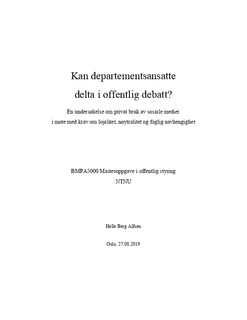Kan departementsansatte delta i offentlig debatt? En undersøkelse om privat bruk av sosiale medier i møte med krav om lojalitet, nøytralitet og faglig uavhengighet
Master thesis
Permanent lenke
http://hdl.handle.net/11250/2624631Utgivelsesdato
2019Metadata
Vis full innførselSamlinger
- NTNU Handelshøyskolen [1623]
Sammendrag
I lys av Knut Dahl Jacobsens klassiske artikkel om forvaltningsverdier i sentraladministrasjonen fra 1960, undersøker denne masteroppgaven forholdet mellom forvaltningsverdiene lojalitet, nøytralitet og faglig uavhengighet og ansatte i departementenes opplevelse av ytringsfrihet i sin private bruk av sosiale medier til meningsytring om politiske og samfunnsmessige spørsmål. Det er utført en kvantitativ undersøkelse med 156 ansatte som respondenter. Den viser at departementsansatte i liten grad bruker sosiale medier til dette formålet, og at forvaltningsverdiene står sterkt. Det finnes statistisk sammenheng mellom nøytralitet og bruk av sosiale medier. Utvalget i undersøkelsen er ikke basert på enkelt tilfeldig trekning, og selv om denne samvariasjonen er signifikant, kan resultatet ikke generaliseres til populasjonen. Undersøkelsen viser at de unge er mest usikre på hvor grensene går for hva de kan ytre seg om, men at de like fullt bruker sosiale medier mer enn de eldre, men med liten grad av engasjement i ytringene. Blant de ansatte som er tilbøyelige til å ytre seg om politiske og samfunnsmessige temaer på sosiale medier, finner vi at en stor andel vegrer seg. Oppgaven drøfter hvorvidt dette forårsakes av forhold på arbeidsplassen, og om det er et demokratisk problem. In light of Knut Dahl Jacobsen's classic article on public governance values in the ministries from 1960, this master's thesis discusses the tension between the values loyalty, neutrality and professional integrity and the degree to which employees of the ministries feel free to express their opinions regarding social and political issues in their personal use of social media. A quantitative survey was conducted with 156 respondents. It suggests that employees of the ministries use social media for this purpose only to a small extent, and that the public governance values are important to them. There is some statistical correlation between neutrality and the use of social media. However, the survey sample is not based on simple random draws, and although this co-variation is significant, the results should not be generalized to the population at large. The survey suggests that young employees are less secure about where the boundaries are with regard to what they may express. However they nevertheless use social media more than older employees do (although with only a small degree of active engagement in their contributions). Among those employees who are inclined to engage with political and social issues on social media, we find that many suffer from a self-imposed censorship. The thesis discusses whether this is caused by the workplace conditions and whether it is a democratic problem.
